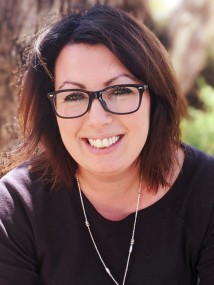Michelle Fitts
Senior Research Fellow
Qualifications:
PhD, Queensland University of Technology, 2015; Postgraduate Diploma in Criminology, The University of Melbourne, 2008; Graduate Diploma in Criminology, The University of Melbourne, 2007; Bachelor of Science (Psychology), Deakin University, 2005;
Location:
Biography:
Michelle is a Senior Research Fellow at the Institute for Culture and Society, Western Sydney University who lives and works in Mparntwe Alice Springs. Michelle is also an Adjunct Research Fellow at Menzies School of Health Research and James Cook University. She started her career in alcohol research in Queensland in 2010.
Since 2015, she has committed her research energy to disability, with a focus on rehabilitation and recovery after traumatic brain injury. Michelle holds an ARC DECRA Fellowship (2021-24) focused on understanding the needs and priorities of Aboriginal and Torres Strait Islander women living with traumatic brain injury from family violence. Michelle and her colleagues are working with urban, regional and remote communities to also understand the strengths and gaps in service design and delivery for Aboriginal and Torres Strait Islander women who live with traumatic brain injury from family violence. This program of work with Aboriginal and Torres Strait Islander women living with traumatic brain injury from family violence, their families and the services who support them seeks to bridge the gap between research and practice and help inform the service delivery of disability, legal, health and family violence agencies. As Chief Investigator, Michelle has played a key role in grants totalling >$7.5m. Michelle’s publications have been taken up in multiple reviews and informed the development of traumatic brain injury resources as well as traumatic brain injury education and training needs for community and the frontline workforce.
Research Themes
- Traumatic brain injury
- Family violence
- Disability
- Remote health workforce
- Research translation
- The cost and health impact of short-term health staffing in remote and rural Aboriginal and Torres Strait Islander communities: Does Community Control make a difference? (ARC DP190100328).
- Optimising remote primary health care service access through evidence-based workforce retention strategies.
- Evaluation of the Central Australian Medical Retrieval and Consultation Centre.
- Fitts, M.S., & Soldatic, K. Temporalities of emergency: The experiences of Aboriginal and Torres Strait Islander women with traumatic brain injury from violence waiting for healthcare and service supports. Health Sociology Review. (under review)
- Fitts, M.S., Johnson, Y. & Soldatic, K. (2024). The Emergency Department Response to Indigenous Women Experiencing Traumatic Brain Injury from Family Violence: Insights from Interviews with Hospital Staff in Regional Australia. Journal of Family Violence. https://doi.org/10.1007/s10896-023-00678-5
- Fitts, M.S., Cullen, J., & Barney, J. (2023). Barriers Preventing Indigenous Women with Violence-Related Head Injuries from Accessing Services in Australia. Australian Social Work. 76(3), 406–419, DOI: 10.1080/0312407X.2023.2210115
- Fitts, M. S., & Soldatic, K. (2022). Who’s caring for whom? Disabled Indigenous carers experiences of Australia’s infrastructures of social protection. Journal of Family Studies, 28(2), 477–492. https://doi.org/10.1080/13229400.2020.1734478
- Fitts, M.S & Soldatic, K. (2020). Why extended time on Newstart is unsuitable for Aboriginal and Torres Strait Islander Australians with disability. Australian Journal of Social Work. 73(2), 191–203. https://doi.org/10.1080/0312407X.2019.1683214
- Fitts, M.S., Bird, K., Gilroy, J., Fleming, J., Clough, A., Esterman, A., Maruff P., Fatima, Y. & Bohanna, I. (2019). The Transition Support Needs of Indigenous Australians Following Traumatic Brain Injury. Brain Impairment, 20 (2), 137-159. https://doi.org/10.1017/BrImp.2019.24
- Bohanna, I., Fitts, M.S., Bird, K., Fleming, J., Gilroy, J., Clough, A., Esterman, A., Maruff P. & Potter, M. (2019). The Potential of a Narrative and Creative Arts Approach to Enhance Transition Outcomes for Indigenous Australians Following Traumatic Brain Injury. Brain Impairment, 20(2), 1-11. https://doi.org/10.1017/BrImp.2019.25
- Esterman, A., Thompson, F., Fitts, M., Gilroy, J., Fleming, J., Maruff, P., Clough, A. & Bohanna, I. (2018). Incidence of emergency department presentations for traumatic brain injury in indigenous and non-indigenous residents aged 15–64 over the 9-year period 2007–2015 in north Queensland, Australia. Injury Epidemiology, 5(1), 1-7. https://doi.org/10.1186/s40621-018-0172-9
- Clough, A.R., Fitts, M.S., Muller, R., Ypinazar, V. & Margolis, S. (2018). A longitudinal observation study assessing changes in indicators of serious injury and violence with alcohol controls in four remote Indigenous Australian communities in far north Queensland (2000–2015). BMC Public Health, 18(1), 1-12. https://doi.org/10.1186/s12889-018-6033-1
- West, C., Muller, R., Clough, A.R. & Fitts, M.S. (2018). Have Alcohol Management Plans reduced violence against women in Cape York, Australia? Violence against Women, 24 (14). 1658-1677. https://doi.org/10.1177/1077801217742756

